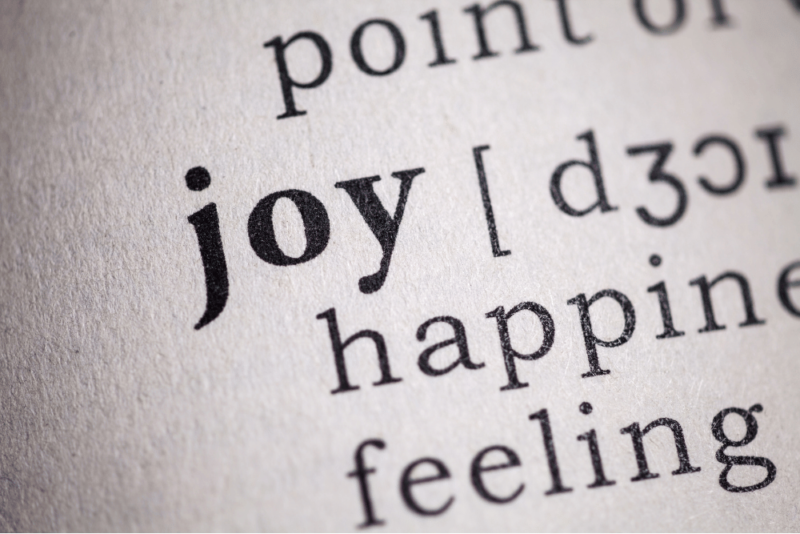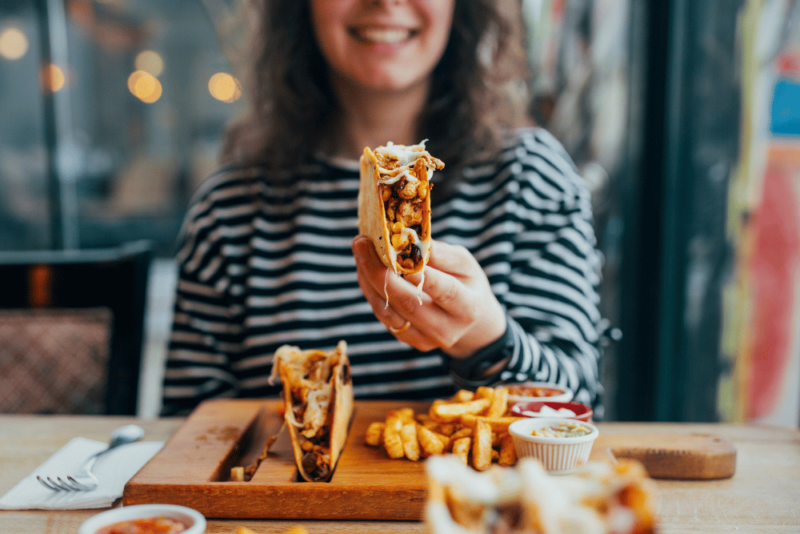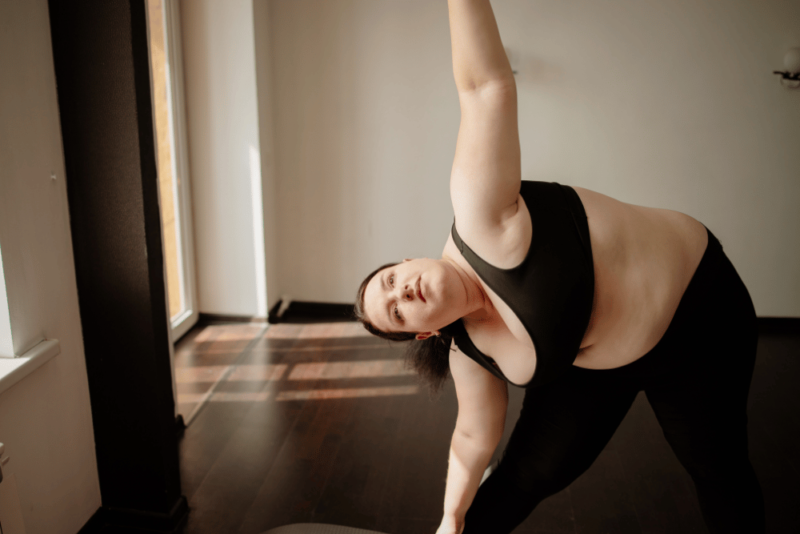

Joy is a big part of Intuitive Eating and other non-diet approaches to health and well-being, even when the word “joy” isn’t specifically used.
- Movement (“Choose types of exercise you enjoy,” “Make movement fun”)
- Eating (“Don’t be afraid to enjoy your food,” “Regain your pleasure in eating,” “Make your eating experience more enjoyable, “Choose foods that are satisfying to you”)
But if you’ve had a fraught relationship with food and movement, finding joy in them might feel unattainable, or even frightening.
You might fear that if you eat foods you truly find enjoyable, you won’t stop eating. You might be at a place where engaging in any form of movement triggers diet mind, because, for you, movement (exercise, physical activity) has been nothing more than a tool for trying to change your body shape or size.
And what if you have trouble even identifying what “joy” feels like?
There are many facets of learning to eat intuitively and care for your health in a way that doesn’t focus on weight or weight loss. Most of those facets don’t center on joy, or enjoyment, specifically.
So if you are trying to step off the hamster wheel of chronic dieting and cultivate a more peaceful, balanced relationship with food and movement, but the joy piece feels hard it may be helpful to do two things:
One, start with the parts of intuitive eating that aren’t joy related.
Two, look for places to find joy in life.


What does joy feel like to you?
I ask each of my new clients what they do for fun and/or creativity. Many find it hard to come up with an answer, or they answer in the past tense, “I used to do XYZ, but I guess I haven’t really done that for a while.”
Each of us deserves joy. What you find joyful might look very different than what someone else would find joyful.
Some people find joy in quiet things like puttering in the garden, watching birds in their yard or the park, curling up with a cozy blanket and a book. Other people find joy in social things like going dancing, having new travel experiences, having big get-togethers with friends.
If you aren’t currently experiencing joy in life, finding joy in food and movement may be a big ask. What would joy in food and movement even feel like? What might happen if you try to put all your “joy eggs” in the food and movement basket?
- Trying to make food your primary source of joy can lead to an unbalanced relationship with food, one that may include significant emotional eating.
- Trying to make movement your primary source of joy may lead to compulsive exercise, overexercising or exercise dependence. Again, not a balanced relationship.
When you have real joy in your life, whether it be quiet and introverted or loud and extroverted, then it may feel easier to expand your joy bubble to food and movement. What might that look like?


Why find joy in eating?
Some people have always had uncomplicated relationships with food — often because they didn’t grow up with parents who were dieting or otherwise enforcing ideas about food and health — and those unicorns can find joy in eating just as easily as they can eat for sustenance. But for everyone else, it’s not so easy.
If you have a history of being focused on eating to lose weight or achieve “ideal” health, it may feel like if you’re being “good,” then food isn’t particularly joyful, but if you’re being “bad,” any joy is followed by guilt and recrimination, and possibly a stomachache. (Or, the food should have been enjoyable, but you were so busy thinking “I shouldn’t be eating this” WHILE you were eating it that you robbed yourself of joy.)
Learning to be an intuitive eater is one of the best paths to explore and reclaim true food joy. The closest principle to eating for joy in “Intuitive Eating” is “Discover the Satisfaction Factor.”
Yes, food is our fuel, but when we enjoy our food, the pleasure we experiences ADDS to our satisfaction. And food satisfaction and pleasure not only adds to our happiness, it makes it more likely that we will happily eat a variety of nutritious foods.
Satisfaction is so important that it’s the hub around which all the other principles rotate:
- When you make peace with food and let go of the idea of “forbidden” foods, you stop swinging on the deprivation-rebound eating pendulum, so it’s easier to eat joyfully without falling into a food free-for-all.
- When you reject the diet mentality, you no longer choose foods base on whether they will help you lose weight.
- When you honor your hunger, you avoid becoming so primally hungry that you can barely taste your food.
- When you feel your fullness, you find it easier to stop eating when you’re comfortably full, and if there’s sadness about saying “enough” to enjoyable food, you can truthfully remind yourself that there’s plenty of future food joy to be had.
- When you challenge the food police in your head, foods no longer have moral (“good” or “bad”), value, it’s easier to eat joyfully without feeling guilty.
You get the idea.
Related Posts:


Why find joy in movement?
If exercise has never been something you consider enjoyable, how do you even start to identify which of the countless forms of movement might spark joy? Here are some ideas to get you thinking:
If being in nature brings you joy, then outdoor exercise — hiking, walking or biking in a leafy neighborhood or trail, maybe group exercise in a park — may also feel joyful.
If you’re an introvert who has to spend a lot of time interacting with people, solo movement might be more enjoyable and restorative. Solo movement may also feel more enjoyable if you feel uncomfortable being observed while exercising, no matter what the reason.
If you’re an extrovert, look for activities that include socializing. For example, going for a walk, hike or bike ride with friends; joining a class or Meetup group to potentially make new friends; lifting weights at a gym instead of at home.
If you enjoy challenging yourself mentally and physically, you might enjoy researching hiking trails in your area and gradually upping the difficulty level. You might benefit from working with a personal trainer who can help you push yourself in the weight room in a way that helps you get stronger while avoiding injury. You might enjoy learning a new sports skill or a new form of dance. You might be someone who actually enjoys “boot camp” classes.
If travel brings you joy, you might enjoy exploring the dances of different cultures, or you might “frame” your exercise as training for travel—walking a lot so you can sightsee on foot, lifting weights so you can easily handle your luggage, biking so you can prepare for a bike tour through Tuscany.


From fear to joy
If you are recovering from an unhealthy relationship with exercise — maybe you used to overexercise to the point where you injured yourself, maybe you had an exercise compulsion that made you miss quality time with friends and family, maybe you’re recovering from dieting and trying to exercise makes you feel like diet culture is sucking your back in — then it may feel scary to even try to find joy in what was once problematic.
For one of my clients, running was her go-to back when she was trying to make herself smaller. She thought she might also actually enjoy running, but was warily circling the idea of giving it another go. We talked about it quite a bit before she decided to try again. She had done enough work breaking free of diet culture that she didn’t feel triggered — and she discovered that she experienced a delicious feeling of freedom when she ran.
Another client, while she did use exercise to lose weight for years and years, also had an inherent love of being active. She would lose that joy whenever her yo-yo dieting had her weight on the upswing, because she wanted to hide her body so she stopped going for walks, going to the gym, going to classes. Today, she powerlifts, goes on yoga retreats and does demanding hikes. She’s realized that she really enjoys continually challenging herself — she’s not only challenging herself physically but also challenging deep-seated ideas from childhood about what she’s capable of. And it doesn’t matter what the scale says.
Another client realized that what she wants from physical activity is a sense of play, similar to how we moved our bodies as kids when there was no goal other than to have fun. She’s still exploring ways to bring that into her adult life, but her realization was an important first step.
Related post:


Back to you
If you don’t happen to find movement very joyful, and realize that if you do find food enjoyable, you often feel guilty about it, I encourage you to look at your life.
- Do you have a general joy deficit?
- What are you doing for fun?
- If you are someone who has historically enjoyed being creative, what do you do to feed your creativity now?
It can be helpful to think of what you used to do for fun when you were younger and (hopefully) had fewer responsibilities. This doesn’t mean you will necessarily enjoy those same things now, but you might. It’s worth experimenting.
I also think it’s helpful to question whether some of the things you do for enjoyment now are actually enjoyable for you. What do I mean by that?
Let’s take screentime as an example. You might think you enjoy scrolling through Instagram, but do you? Or do some of the accounts you follow stress you out or make you feel bad about yourself? Or do you get sucked into the scrolling for so long that when you come up for air you feel tired and wonder where the afternoon or evening went? Browsing social media might still be enjoyable for you…if you edit your feed and set some boundaries around how much you use it.
Now for TV. You might have shows you really enjoy watching, but do you find you get sucked into “just one more episode” and then it’s three more and you’ve stayed up too long and you’re too tired to brush your teeth and you have a hard time getting up in the morning then you’re rushing around trying to start your day? Is that enjoyable? Again, boundaries may make all the difference.
Or, maybe you’re doing things that someone else (spouse, partner, friend) finds enjoyable, and you have just gone along assuming you enjoy those things, too, but when you look closely, you realize that you really don’t.
Or, maybe you have hobbies that you used to find enjoyable, and you still do them, but when you look closely, you realize that you’ve been operating based on autopilot more than true joy.
What “joy” means to you depends on your likes and dislikes, where you lie on the introvert-to-extrovert scale, your personal need for routine or novelty, your values and so much more. Whatever it is, you deserve to find it!
This post contains Amazon Affiliate links. As an Amazon Associate I earn from qualifying purchases.
Carrie Dennett, MPH, RDN, is a Pacific Northwest-based registered dietitian nutritionist, journalist, intuitive eating counselor, author, and speaker. Her superpowers include busting nutrition myths and empowering women to feel better in their bodies and make food choices that support pleasure, nutrition and health. This post is for informational purposes only and does not constitute individualized nutrition or medical advice.
Seeking 1-on-1 nutrition counseling? Learn more about her Food & Body, IBS management, and nutrition counseling programs, and book an intro call to see if the program is a good fit, and if we’re a good fit!
Want exclusive content on nutrition, health, diet culture and more, plus critiques of nutrition and health journalism? Subscribe to my Food Noise newsletter! 📣






:max_bytes(150000):strip_icc()/State-of-NA-FT-MAG-0425-688ee5bcac3c4c11985b905aba855e0c.jpg?w=238&resize=238,178&ssl=1)






